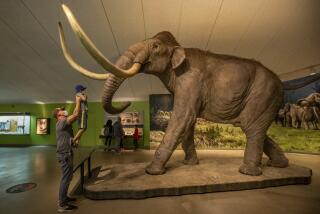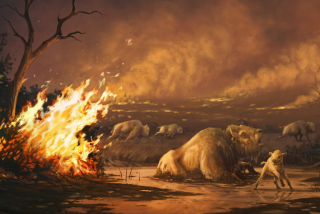Samuel Epstein, 81; Used Isotopes to Measure Ancient Climate Changes
- Share via
Samuel Epstein, Caltech geochemist who examined tree rings of 8,000-year-old bristlecone pines in the California mountains; ice cores from glaciers in Antarctica, Greenland and Alaska; and fossilized marine creatures from the world’s oceans to determine climate shifts through the millenniums, has died. He was 81.
Epstein, who taught at Caltech from 1952 until 1990 and worked daily in his laboratory until recently, died Monday in Pasadena.
After he developed the use of oxygen isotopes to study temperature, Epstein applied his measurement tests to various materials including the ice, trees, carbonate fossils, a flint-like rock called chert from geological formations across the central and western United States, California’s hydrothermal geysers, meteorites, and soil and rock samples brought back from the moon.
Despite current warnings of global warming, Epstein’s career research led him to the conclusion that the Earth has been cooling for at least 7,000 years. His measurements of trees in California’s White Mountains showed that temperatures have declined about 5 degrees since 4800 BC, he said in 1994.
Epstein earlier estimated, based on his studies, that Earth may have been as hot as 160 degrees 3 billion years ago.
That, he told The Times in 1976, could explain why the earliest life forms, as determined by fossils, appear to have been bacteria and blue-green algae that could survive such extreme heat.
“The Earth may simply have been too hot and too humid for any sophisticated life to have evolved,” he said.
Epstein cautioned in recent years, however, that his studies of ancient climate patterns are not necessarily applicable to the future. Because of the proliferation of greenhouse gases and other factors, he said in 1994, “the modern climate is much more unpredictable.”
Born in Kobryn, Poland (now Belarus), Epstein as a child immigrated with his family to Winnipeg, Canada. He earned bachelor’s degrees in geology and chemistry and a master’s in chemistry from the University of Manitoba and a doctorate in chemistry from McGill University in Montreal.
During World War II, Epstein worked on rare gas fission products for the Canadian Atomic Energy Project in Montreal.
In 1947, he accepted an opportunity to work with Nobel laureate Harold Urey at the University of Chicago, using oxygen isotopes to study temperature. The project made historic breakthroughs in stable isotope geochemistry, enabling the team to calculate the temperatures of oceans that existed about 70 million years ago. Epstein quickly made the measurement of oxygen isotopes to determine temperature changes his life’s work.
In 1952, a year before he became an American citizen, Epstein moved west to helped found Caltech’s geochemistry program.
A former president of the Geochemical Society, Epstein earned its Goldschmidt Medal and other awards, including the Day Medal of the Geological Society of America, the Wollaston Medal of the Geological Society of London and the Urey Medal of the European Assn. of Geochemistry.
Epstein is survived by his wife, the former Diane Vool; two sons, Reuben and Albert; and three grandchildren.






